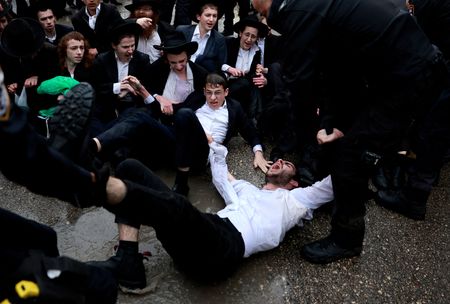By Dan Williams
JERUSALEM (Reuters) -Prime Minister Benjamin Netanyahu on Thursday asked Israel’s top court to defer a March 31 deadline for the government to come up with a new military conscription plan that would address mainstream anger at exemptions granted to ultra-Orthodox Jews.
The decades-old controversy has become especially sensitive as Israel’s armed forces, made up mostly of teenaged conscripts and older civilians mobilised for reserve duty, wage a nearly six-month-old war in Gaza to try to eliminate the Islamist Hamas movement that rules the Palestinian enclave.
While the Supreme Court did not immediately respond to Netanyahu’s request, it ruled separately that state subsidies for military-age ultra-Orthodox men studying in seminaries rather than serving in uniform be suspended as of Monday.
The two ultra-Orthodox parties in Netanyahu’s religious-nationalist coalition, United Torah Judaism and Shas, denounced the ruling as a “mark of Cain.” They vowed to fight for what they deemed their constituents’ “right” to stay in seminaries – but stopped short of threatening to walk out of the government.
Piling on the pressure, Netanyahu’s attorney-general, Gali Baharav-Miara, wrote in a submission to the court that she saw no legal basis for deferring the ultra-Orthodox conscriptions.
The Supreme Court in 2018 found in favour of appellants who argued that the waiver was discriminatory. Parliament failed to come up with a new arrangement, and a government-issued stay on mandatory conscription of the ultra-Orthodox expires on Monday.
Those favouring a review of the exemption include Netanyahu’s defence minister and other cabinet members managing the war. They predict months of more fighting that will strain manpower and stoke public demands for more equitable call-ups.
One senior Israeli official estimated that 5% of the population was taking part in the Gaza conflict, which has spread to Lebanon and Syria and drawn missile salvoes from other Iranian-aligned groups as far away as in Yemen and Iraq.
But United Torah Judaism and Shas, to which the conservative leader has long looked for support, want to keep the waivers as a means of preserving the ultra-Orthodox religious lifestyle.
Netanyahu in a letter to the Supreme Court published by his office said he had “made salient progress on the draft issue” but asked for a 30-day extension “in order to draft agreements.”
The Gaza war has dominated the government’s attention and is now at a decisive point, he said.
The ultra-Orthodox make up 13% of Israel’s 10 million population, a figure expected to reach 19% by 2035 due to their high birth rates. Economists argue that the waiver from the draft keeps some unnecessarily in seminaries and out of the workforce, spelling a growing welfare burden for middle-class taxpayers.
Israel’s 21% Arab minority are also mostly exempted from the draft, under which men and women are generally called up at age 18, with men serving three years and women two.
(Writing by Dan Williams; Editing by Frances Kerry and Mark Porter)









